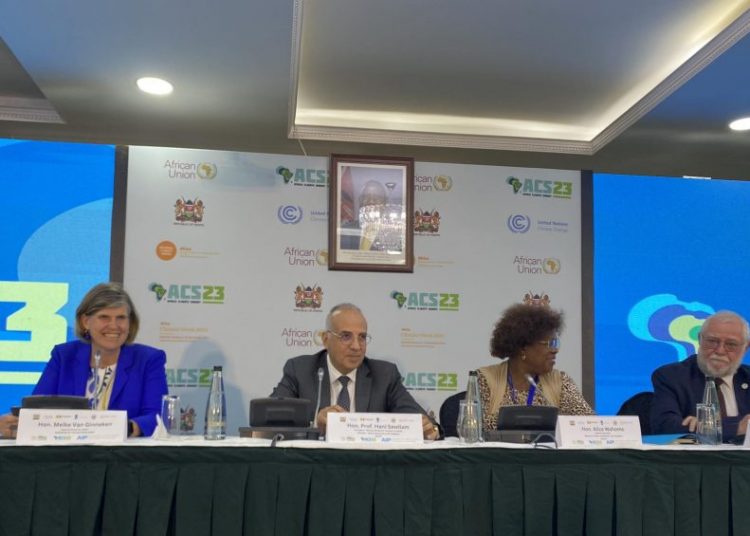Prof. Hani Sewilam to The Egyptian Gazette
The water file has been at the core of the first Africa Climate Summit and Africa Climate Week held in the Kenyan Capital, Nairobi on 4-6 September. The conference explored into water’s pivotal role in Africa’s socio-economic development besides shedding light on its importance in buildingclimate resilience amidst challenges.
In an interview with The Egyptian Gazette, Prof. Hani Sewilam, President of African Ministers’ Council on Water, and Egypt’s Minister for WaterResources and Irrigation stressed that water must be at heart of climate action and should be present on discussion tables just as the energy file was tackled for several days. The water file cannot be overlooked in climate conferences,” he added.
The minister went on to say that Egypt played a leading role in bringing water at heart of climate action through diverse major events like the last edition of Cairo Water Week that was held under the theme ‘Water at heart of climate action’. In a groundbreaking move, Egypt has also brought water file at the heart of the 27th Conference of the Parties to the United Nations Framework Convention on Climate Change (COP27) and the UN Water Conference held in New York earlier in March.
“There is a great momentum in this file and this is great progress.”
Highlighting Egypt’s relentless efforts in this regard, Sewilam pointed out that Egypt, in co-operation with Japan, chaired the third interactive dialogue of the 2023 Water Conference, held as part of the UN Water Conference in March.
“There is momentum. Now you can see many water ministers attending climate conferences, especially from Africa. And this is in particular a real transformation in terms of dealing with water issues and positioning water at centre of the climate agenda,” he said.
The minister also highlighted to historic outcome of COP27, namely establishing the Loss and Damage Fund thanks to Egypt and co-ordination with partners.
“In the summit, we build on the outcomes of COP27.”
In a related context, Sewilam referred to the ongoing momentum over AWARe (Action on Water Adaptation or Resilience) initiative, that seeks to foster inclusive co-operation to address water related challenges and solutions across climate change adaptation.
The AWARe initiative was drafted by the COP27 Presidency with support of WMO and was launched on Water Day on 14 November last year.
“AWARe is on the global agenda as it is one of the outcomes of COP27 and UN Water Conference recommendations. Many organisations participated in the initiative such as the Food and Agriculture Organization (FAO), World Meteorological Organisation (WMO) and UNESCO.”
AWARe focuses on three priorities for action: Decreasing water losses worldwide and improving water supply, proposing and supporting implementing mutually agreed policy and methods for cooperative water-related adaptation action and its co-benefits as well as promoting cooperation and interlinkages between water and climate action in order to achieve Agenda 2030, in particular SDG 6.
“The initiative just started last November, less than a year ago. However, there is great momentum over it. There is ongoing co-ordination with UAE to bring the initiative to COP28. I again confirm that water must be at heart of climate action rather than confining this file to energy axis.”
Sewilam also referred to the launch of the Pan-African Centre for Water Climate Adaptation that focuses on finance, technology and capacity building.
Sewilam chaired a panel discussion at Africa Climate Summit, ‘Accelerating Climate Resilient Investments in Water’. In his speech, the minister pointed out that Egypt depends on the Nile water for 97 per cent of its demands, which is coming for our neighboring brother countries.
“So, any change in the hydrological extremes in the Nile Basin impacts Egypt,” he said.
Meanwhile, the severe impacts of climate change are evidenced rising sea levels of the Mediterranean.
“We can see these impacts like the coastal erosion in the North Coast and the negative impact on the quality of ground water due to theincreasing saltwater intrusion in groundwater.”
As for investments, the minister said that Egypt invested $10 billion over the last five years in adaptation to climate change, in canal lining , in switching to modern irrigation and other water projects.






Discussion about this post